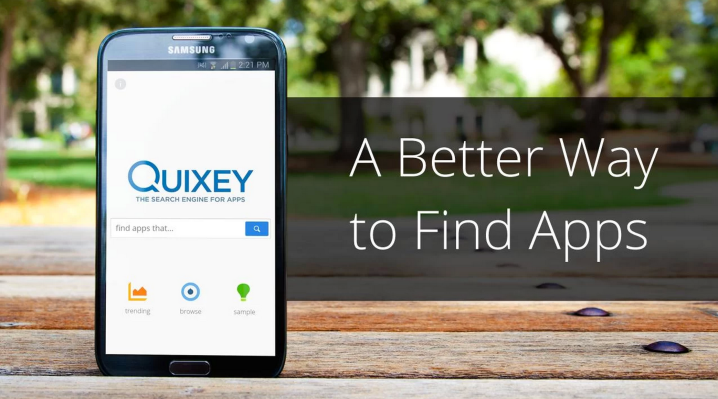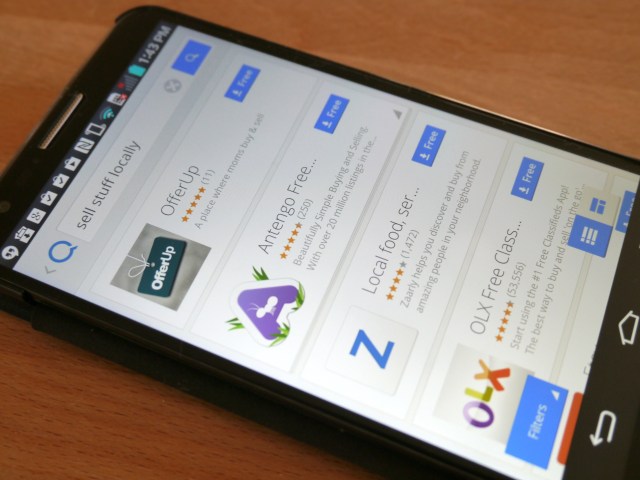A couple of weeks ago, mobile app search engine Quixey raised $50 million in Series C funding from Chinese e-commerce giant Alibaba and others, and today we’re getting to see the first results of what’s come of that with the debut of Quixey’s first consumer-facing Android app search utility, now available on Google Play.
Until today, Quixey has primarily worked with business customers, including Sprint, Ask.com, browser makers, and OEMs, who license its technology to power their own app search engines and experiences. But at the time of the funding announcement, Quixey CEO Tomer Kagan said that the company would have something “pretty major” in the consumer realm in just a few weeks.
We understood that would be an Android application which allows Quixey’s search service to be better baked into users’ smartphones. With the new app, out now, users can search for apps using simple descriptions instead of app titles and keywords, the company says.
The Google Play Android app store passed one million apps back in July, becoming the dominant store by app volume. But the sheer number of apps available on the platform introduces the problem of too much choice, with scores of apps to wade through, especially when it comes to more generic keyword searches. So enter Quixey on a mission to make app discovery smarter.
Quixey knows how to match descriptions with apps because of the way it has built up its search technology over the years. As opposed to only relying on the fields that the app developers themselves fill in when publishing apps to the various app stores, Quixey has also indexed unstructured data from the web, like app reviews, blogs, news articles, social media posts, and more, to determine what an app really does.
When you launch Quixey’s app for the first time, the search interface gives you a sense of how you can use this technology, offering a few sample suggestions of the queries it makes possible, like “improve battery life,” “read at my leisure,” or “play action games,” for example.
The app also offers a few other features, too, for discovering apps in ways Google Play does not currently support. There’s a “Browse” interface that lets you spin a wheel between categories like “Play,” “Work,” “Live,” and “Learn,” which then takes you to subcategory options where you spin again to drill down further and be returned specific app lists. It’s a clever interface, but feels more experimental than practical for the time being, and it’s hard to say if it’s truly that much better than moving between app categories on the Google Play store itself.
Meanwhile, a customized “trending” section is a bit more useful, as it lets you find the top apps for various demographic and interest groups (e.g. “shoppers,” “entrepreneurs,” “teens,” “pet lovers,” etc.). And lastly, a “Sample Sort” feature lets you create and sort sample search queries by different personal needs, like “calculate my mortgage,” or “share photos,” for instance. (I think this section could be better titled to explain what it does, though.)
Overall, probably the best part of Quixey’s search is that you can be more descriptive with your needs, instead of having to think up an app by name, or trying to figure out what keywords a developer would have used. Instead you can go app hunting using phrases like ‘sell stuff locally’ or ‘tune my guitar’.
This is definitely a more human way to approach app discovery, and should in theory help to open up apps to new users who struggled to find them before — because they didn’t know they existed or what they were called. Although, if you’re setting users free to be a little more colloquial in how they search for apps, that does introduce linguistic complexity — based on differences in vocabulary, slang and so on, from one user to the next. And those differences may compromise the accuracy of the search results.
HANDS ON
In some brief hands on testing, the feature did appear a little hit and miss — especially for more complex queries. (Although irrelevant app results may be a hint that there just aren’t the apps to fulfil your particular niche need yet).
For example, a search for ‘find run buddies in my area’ — admittedly a pretty complex query — returned as the first result an app for finding the closest beer, liquor & wine stores (!), followed by Nike+ Running (relevant), and then the eBuddy Messenger app (irrelevant).
Searching for ‘random photo sharing’ delivered a better crop of results, with Kicksend coming first, followed by Rando and PhotoShake. So the rule of thumb appears to be the broader and cleaner your query, the more accurate will be the results.
Asked about the accuracy point, Quixey told TechCrunch: “While keeping in mind that search is a discipline that’s constantly evolving and never perfected, we’re confident that our algorithms will accurately solve most people’s queries – the majority of user behavior we see produces highly relevant results. We are the best when compared to competition today in the market and will only get better as increase our margin on performance. App and functional search is very hard to perfect, and we’re setting the right foundation to build on in the future.”
The Quixey app itself is free, though ultimately it leaves itself open to paid placements for apps as a way to generate revenue.
However, the company has a larger goal of enabling users to not just find apps, but find the content within their apps. You could then search for things like “Thai food” nearby, and find a list of restaurants and a map as you would have before, but also reviews from Yelp and Foursquare, Groupon deals, Foodspotting reviews, and more, as just one example.
That larger vision is not yet realized in the app Quixey launched today, which is just an app search and discovery utility. But with the additional funding, it should be interesting to keep an eye on what the company does next.
TechCrunch’s Natasha Lomas contributed to this article



